update 15.
chaos in the congos and holidays at home
17 May- 1 July 2007
Total kilometers cycled: 22,477
Republic of Congo, DR Congo and a slice of Europe
Specific country info on routes & roads/food & accommodation/the locals available here.
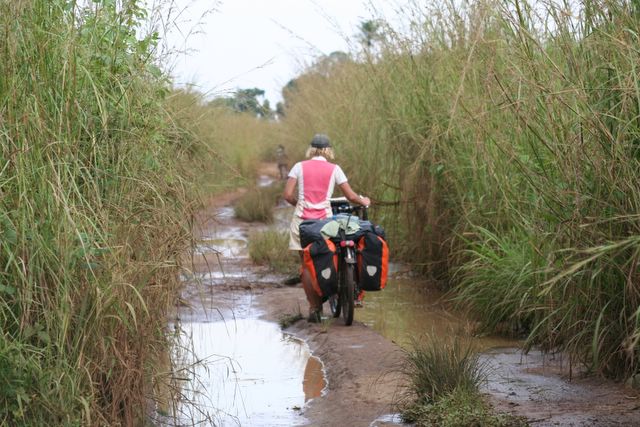 No,
we haven't been kidnapped by gun-toting ninja rebels and Amaya hasn't
been made the umpteenth wife of some minor African king: we've been on
vacation in Europe! More about that later. The last update of our
African saga (and sufferings) left off with Eric in the throes of his
third malaria bout in Gabon just 50 kilometers from the Republic
of Congo border.
The rains had yet to wind down, travel was rough and morale low.
Medical care in the remote border outpost was basic at best and
the only doctor in town had traveled to Libreville for medical
assistance. The hospital staff could do little more than dish out
malaria medicine, so when we returned two days later worried that
Eric's fever had yet to come down and he had developed a nasty
looking rash, they were of little help. Finally we resorted to
self-diagnosis and with the help of our Lonely Planet Africa health
guide we decided he must have contracted Typhoid fever. Luckily we were
carrying the recommended medicine for treatment. He started the
course of drugs and within a few days we were back on the bikes headed
down a narrow, muddy track surrounded by tall grass on our way to
Congo.
No,
we haven't been kidnapped by gun-toting ninja rebels and Amaya hasn't
been made the umpteenth wife of some minor African king: we've been on
vacation in Europe! More about that later. The last update of our
African saga (and sufferings) left off with Eric in the throes of his
third malaria bout in Gabon just 50 kilometers from the Republic
of Congo border.
The rains had yet to wind down, travel was rough and morale low.
Medical care in the remote border outpost was basic at best and
the only doctor in town had traveled to Libreville for medical
assistance. The hospital staff could do little more than dish out
malaria medicine, so when we returned two days later worried that
Eric's fever had yet to come down and he had developed a nasty
looking rash, they were of little help. Finally we resorted to
self-diagnosis and with the help of our Lonely Planet Africa health
guide we decided he must have contracted Typhoid fever. Luckily we were
carrying the recommended medicine for treatment. He started the
course of drugs and within a few days we were back on the bikes headed
down a narrow, muddy track surrounded by tall grass on our way to
Congo. 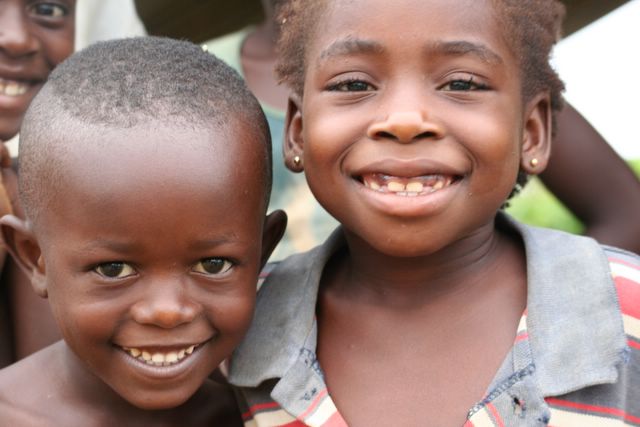 Progress
was fairly good given the less than ideal road conditions and by
mid-day we had reached the border. Here we nearly got lost in the
labyrinth of customs, immigration, police and military posts all
staffed by dodgy officials carefully scrutinizing our documents and
looking for ways to eke a bribe out of us. Despite the scorching
sun the customs guy even insisted on searching all our panniers for
illegal weapons--guess he thought we might be arms-dealers masquerading
as simple cyclists. The police wanted proof that we were really
tourists and entitled to enter on a tourist visa. This was
tricky--how can one prove he
is a tourist? Several hours were wasted with this nonsense, until
the officials eventually tired of the games and realized no money would
be forthcoming. Fortunately the farther we rode from the border,
the friendlier the officials became. At the next town our
passports were returned before
the officer in charge asked for a small donation to pay for fuel for
the generator. 200 kilometers down the road the police were giving us
directions, offering us mandarins and guiding us to a hotel.
Things were looking up.
Progress
was fairly good given the less than ideal road conditions and by
mid-day we had reached the border. Here we nearly got lost in the
labyrinth of customs, immigration, police and military posts all
staffed by dodgy officials carefully scrutinizing our documents and
looking for ways to eke a bribe out of us. Despite the scorching
sun the customs guy even insisted on searching all our panniers for
illegal weapons--guess he thought we might be arms-dealers masquerading
as simple cyclists. The police wanted proof that we were really
tourists and entitled to enter on a tourist visa. This was
tricky--how can one prove he
is a tourist? Several hours were wasted with this nonsense, until
the officials eventually tired of the games and realized no money would
be forthcoming. Fortunately the farther we rode from the border,
the friendlier the officials became. At the next town our
passports were returned before
the officer in charge asked for a small donation to pay for fuel for
the generator. 200 kilometers down the road the police were giving us
directions, offering us mandarins and guiding us to a hotel.
Things were looking up.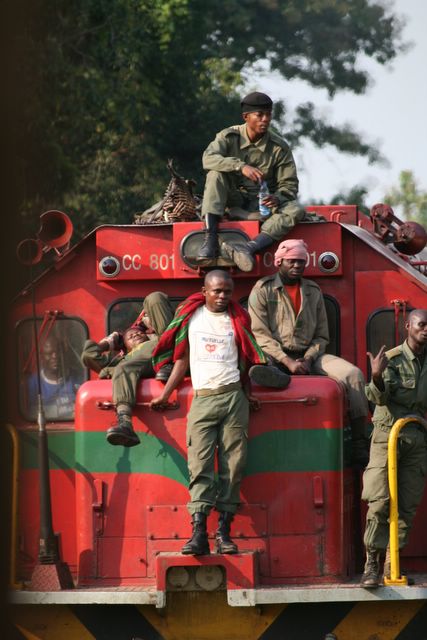 Cycling
came to a halt as we pedaled into Loutete. This was the last
town before the Ninja-zone where drugged-up and well-armed rebels were
known to hassle passing motorists. They were unpredictable, we were
told, and although the peace process was underway it was best not to
take chances. A freight train under military escort was
leaving that evening and the officer in charge said we were welcome to
come along for the ride. 10 PM, the scheduled time of departure,
came and went. We found the young commandant, his colleagues and
some scantily clad female companions downing Ngok beers in the
bar next door. He was unfazed by the delay and told us to check
back again around midnight. We had had the good sense to take a
room at one of the small auberges, so we went back to the hotel, turned
on the fan full-blast in hopes of drowning out the music and set
the alarm for 12:00. No train at 12:00, nor at 2PM when we next
checked back and by 4PM everyone appeared to have conked out (although
the music was still going full blast). When the train finally did
arrive at noon the following day, we were given the place of honor right up
front in the caboose next to the driver. Our bikes were securely
tied down on to the roof just behind the machine gun which was mounted to deter would-be looters and sundry bandits. Our
military escorts were a ragtag bunch--many in flip-flops, others with
the soles of their boots worn through, some in ripped trousers and
wearing an array of t-shirts and camouflage gear. They were
keeping watch from the roof, with AK-47s casually slung over
their shoulders and some armed with rocket launchers and grenades.
The train was ancient--a cast-off from the South Africans--and at
the slightest incline we would slow to a crawl, going no faster
than 20 kilometers per hour. The conductor relished in pointing
on the remains of various derailments and rickety bridges and a look of glee crossed his
face as Amaya cringed. The exhausting 200 kilometer trip took nearly
12 hours and the dark streets were almost deserted when we pulled into
Brazzaville station.
Cycling
came to a halt as we pedaled into Loutete. This was the last
town before the Ninja-zone where drugged-up and well-armed rebels were
known to hassle passing motorists. They were unpredictable, we were
told, and although the peace process was underway it was best not to
take chances. A freight train under military escort was
leaving that evening and the officer in charge said we were welcome to
come along for the ride. 10 PM, the scheduled time of departure,
came and went. We found the young commandant, his colleagues and
some scantily clad female companions downing Ngok beers in the
bar next door. He was unfazed by the delay and told us to check
back again around midnight. We had had the good sense to take a
room at one of the small auberges, so we went back to the hotel, turned
on the fan full-blast in hopes of drowning out the music and set
the alarm for 12:00. No train at 12:00, nor at 2PM when we next
checked back and by 4PM everyone appeared to have conked out (although
the music was still going full blast). When the train finally did
arrive at noon the following day, we were given the place of honor right up
front in the caboose next to the driver. Our bikes were securely
tied down on to the roof just behind the machine gun which was mounted to deter would-be looters and sundry bandits. Our
military escorts were a ragtag bunch--many in flip-flops, others with
the soles of their boots worn through, some in ripped trousers and
wearing an array of t-shirts and camouflage gear. They were
keeping watch from the roof, with AK-47s casually slung over
their shoulders and some armed with rocket launchers and grenades.
The train was ancient--a cast-off from the South Africans--and at
the slightest incline we would slow to a crawl, going no faster
than 20 kilometers per hour. The conductor relished in pointing
on the remains of various derailments and rickety bridges and a look of glee crossed his
face as Amaya cringed. The exhausting 200 kilometer trip took nearly
12 hours and the dark streets were almost deserted when we pulled into
Brazzaville station.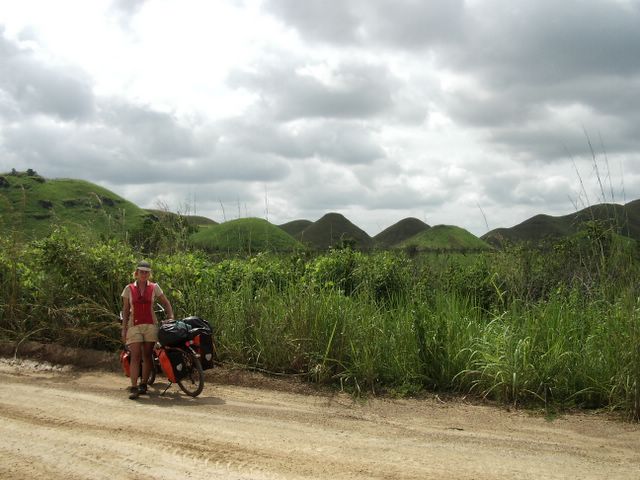 Our
stay in Brazzaville was a pleasant one as we basked in relative
luxury as the guests of Olivier (himself a fellow cyclist) at the
Hippocampe Hotel. Hot showers, satellite TV, rubbing elbows with
UN workers and embassy staff at the buffet--a welcome change from
roughing it on the road. But we eventually had to tear
ourselves away from all the indulgences and head over the river to
Kinshasa in DR Congo since our visas were about to expire. There
was
a flurry of a activity at the border crossing: a brass band was warming
up, a red carpet was being unfurled, sharp shooters were positioned on
the rooftops of surrounding buildings and truckloads of soldiers were
rumbling by. The DRC's president, Joseph Kabila, had come for a
visit to Congo-Brazzaville and the border was closed. We were
turned back and told to come the following morning when the ferry would
be again running as usual. What luck we thought...our visas will
be expired and who knows how much the officers will try to extort from
us.
Our
stay in Brazzaville was a pleasant one as we basked in relative
luxury as the guests of Olivier (himself a fellow cyclist) at the
Hippocampe Hotel. Hot showers, satellite TV, rubbing elbows with
UN workers and embassy staff at the buffet--a welcome change from
roughing it on the road. But we eventually had to tear
ourselves away from all the indulgences and head over the river to
Kinshasa in DR Congo since our visas were about to expire. There
was
a flurry of a activity at the border crossing: a brass band was warming
up, a red carpet was being unfurled, sharp shooters were positioned on
the rooftops of surrounding buildings and truckloads of soldiers were
rumbling by. The DRC's president, Joseph Kabila, had come for a
visit to Congo-Brazzaville and the border was closed. We were
turned back and told to come the following morning when the ferry would
be again running as usual. What luck we thought...our visas will
be expired and who knows how much the officers will try to extort from
us. Cycling back to the hotel we were bemoaning our situation when a sign proclaiming 110,000 FCA Brazzaville-Brussels caught our eye. 165 euros for a flight to Europe? Impossible we thought. Further investigation revealed that the airline, Hewa Bora, was owned by President Kabila's family and this special round trip flight at a rock bottom price was being offered to the people of Brazzaville as a gesture of goodwill. We snapped at the chance and 48 hours later were on a plane headed home.
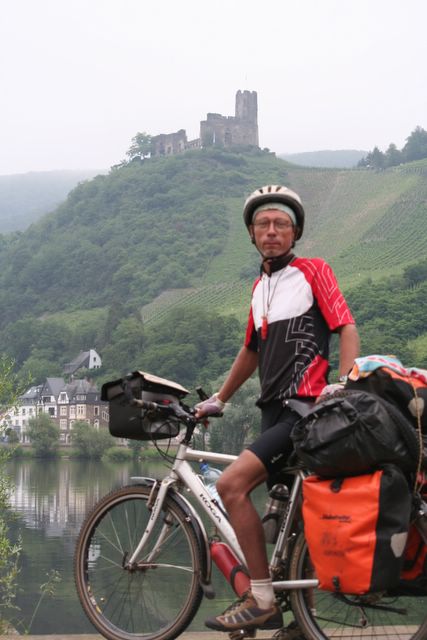
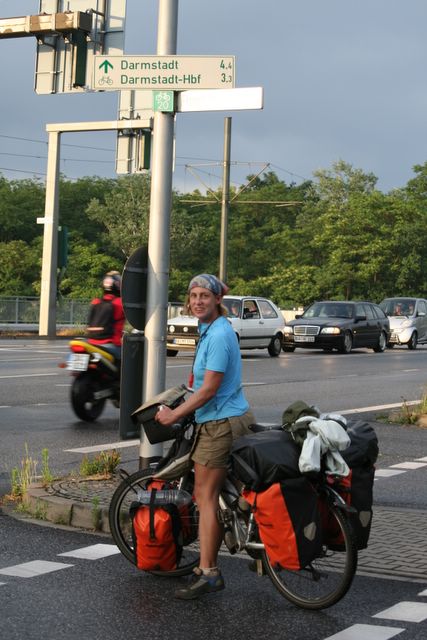
Three weeks of visiting family and friends, gorging ourselves on pizza, pasta, chocolate and croissants and getting the bikes back in shape. We got up late, lounged on the couch, marveled at the selection of food available in the supermarkets and generally enjoyed ourselves. All this plus squeezing in 1,200 kilometers of cycling between Belgium, Germany and France. Surprisingly, the riding wasn't as easy as we had anticipated. We were faced with a bewildering number of choices of roads on the old continent and, with the advent of the GPS, locals are often at a loss when asked for directions. After getting lost for the 12th time in two days, Eric finally broke down and shelled out 6.50 euros for a map! On our return trip to Brussels we arranged lodging through Hospitality Club and Warm Showers. We were warmly welcomed by all our hosts and found this to be a terrific opportunity to get to know people from all walks of life and sample some delicious home cooking.
Our streak of good luck came to an abrupt end in Kinshasa (DR Congo) when our bikes and baggage failed to turn up at the airport. The place was complete chaos with passengers jostling each other as they vied for a place around the luggage conveyor belt, porters tugging at bags hoping for work, policeman keeping back the crowds of itinerant vendors with the help of menacing sticks and absolutely everyone shouting at the top of their lungs. Talk about sensory overload.
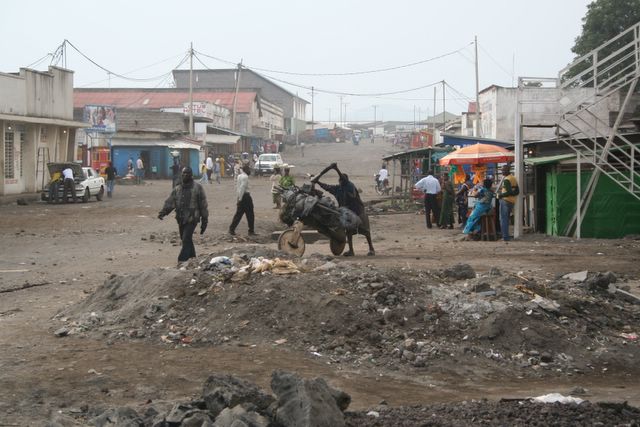 Several
days were spent in this mega city of more than 5 million trying to sort
out the mystery of the disappearing luggage. Thankfully an
efficient Belgian gentleman by the name of Monsieur Lesergent took
charge of the matter and we headed on to Goma near the Rwandan
border where we were overjoyed to be reunited with our bikes two days
later. Goma is something of a latter-day Pompeii, having been smothered
in molten after the eruption of nearby Nyiaragongo volcano in 2002.
The streets are still littered with lava rocks and many entrances
to buildings in the center of town now stand two meters under street
level after having been dug out from the flow. Natural disaster
coupled with the civil war has left the town battered and it was a
dreary place to spend a few days. The high point of our stay was the
Salt and Pepper Indian Restaurant just across from the barracks of the
Indian contingent of UN peace keepers...spicy curries beat bland manioc
any day.
Several
days were spent in this mega city of more than 5 million trying to sort
out the mystery of the disappearing luggage. Thankfully an
efficient Belgian gentleman by the name of Monsieur Lesergent took
charge of the matter and we headed on to Goma near the Rwandan
border where we were overjoyed to be reunited with our bikes two days
later. Goma is something of a latter-day Pompeii, having been smothered
in molten after the eruption of nearby Nyiaragongo volcano in 2002.
The streets are still littered with lava rocks and many entrances
to buildings in the center of town now stand two meters under street
level after having been dug out from the flow. Natural disaster
coupled with the civil war has left the town battered and it was a
dreary place to spend a few days. The high point of our stay was the
Salt and Pepper Indian Restaurant just across from the barracks of the
Indian contingent of UN peace keepers...spicy curries beat bland manioc
any day.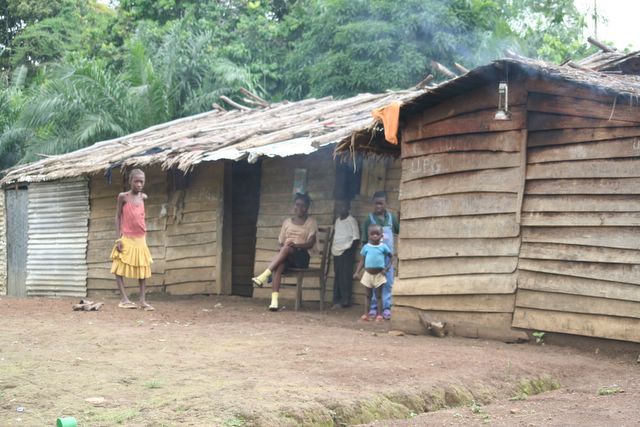 One final hurdle awaited us before being able to bid a final farewell
to the Congos. While American citizens are admitted to
Rwanda with a simple stamp in the passport at the border, the
government in Kigali has broken diplomatic ties with France and now
requires their citizens to apply for entry in advance, either in their
home country or via internet. We weren't privy to this
information and it came as a surprise to us when Eric was initially
turned back at the border. Would we never escape from the claws of the
Congo? A little wangling and some charm did the trick and he was
eventually allowed entry.
One final hurdle awaited us before being able to bid a final farewell
to the Congos. While American citizens are admitted to
Rwanda with a simple stamp in the passport at the border, the
government in Kigali has broken diplomatic ties with France and now
requires their citizens to apply for entry in advance, either in their
home country or via internet. We weren't privy to this
information and it came as a surprise to us when Eric was initially
turned back at the border. Would we never escape from the claws of the
Congo? A little wangling and some charm did the trick and he was
eventually allowed entry. We write to you from Gisenyi, Rwanda, a pleasant lakeside town with wide tree-lined streets, tidy well-stocked shops, inviting restaurants and fantastic views of the surrounding mountains. There's an optimistic feel about the place and we're eager to get back on the bikes and do some exploration of the land of a thousand hills.
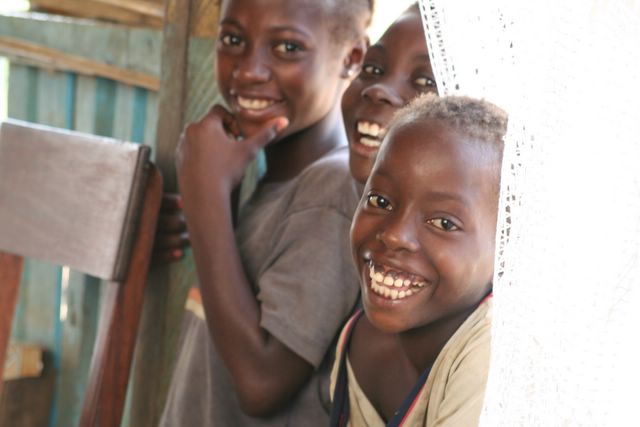
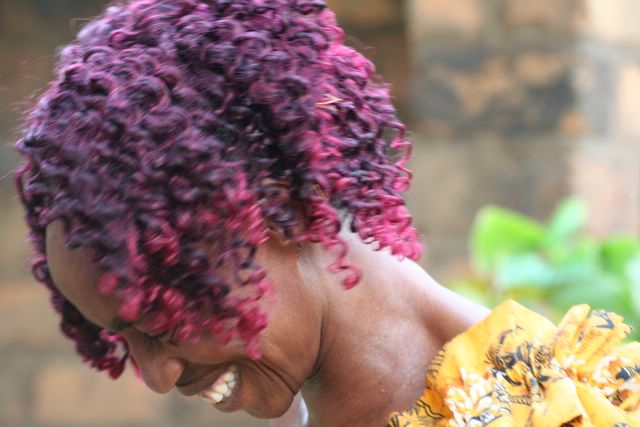
contact us at: worldbiking@gmail.com
Support our chosen charity and help educate girls in Africa-more info here
